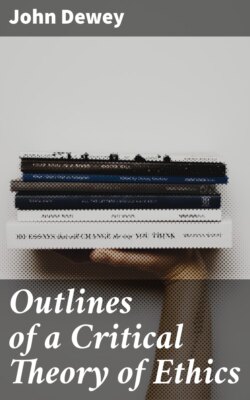Читать книгу Outlines of a Critical Theory of Ethics - Джон Дьюи - Страница 5
На сайте Литреса книга снята с продажи.
I.
ОглавлениеDefinition of Ethics.
The term ethics is derived from a Greek word meaning manners, customs, habits, just as the term morals is derived from a Latin word with a similar meaning. This suggests the character of the science as an account of human action. Anthropology, ethnology, psychology, are also, in their way, accounts of human action. But these latter branches of knowledge simply describe, while the business of ethics is to judge.
This does not mean that it belongs to ethics to prescribe what man ought to do; but that its business is to detect the element of obligation in conduct, to examine conduct to see what gives it its worth. Anthropology, etc., do not take into account the whole of action, but simply some of its aspects—either external or internal. Ethics deals with conduct in its entirety, with reference, that is, to what makes it conduct, its end, its real meaning. Ethics is the science of conduct, understanding by conduct man's activity in its whole reach.
Three of the branches of philosophy may be called normative, implying that they deal with some norm, standard or end, estimating the value of their respective subject-matters as tested by this end. These are Logic, dealing with the end Truth, and the value of intellectual processes with respect to it; Æsthetics, dealing with Beauty and the value of emotional conditions as referred to it; and Ethics, as defined above. But this norm in no case comes from outside the subject-matter; it is the subject-matter considered in its totality.
